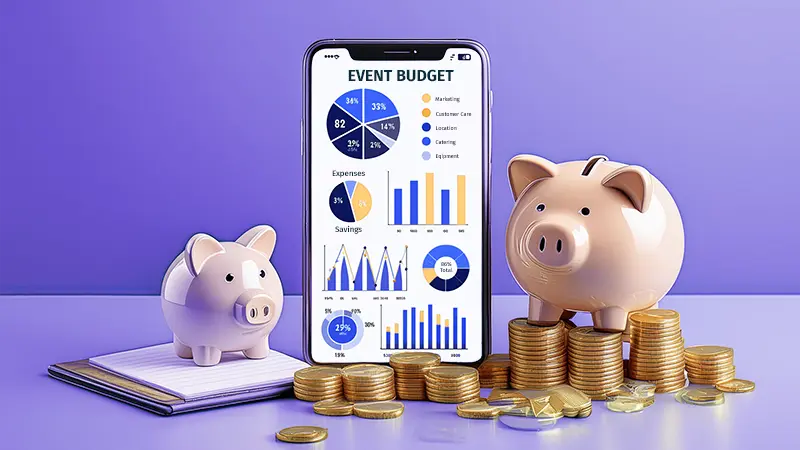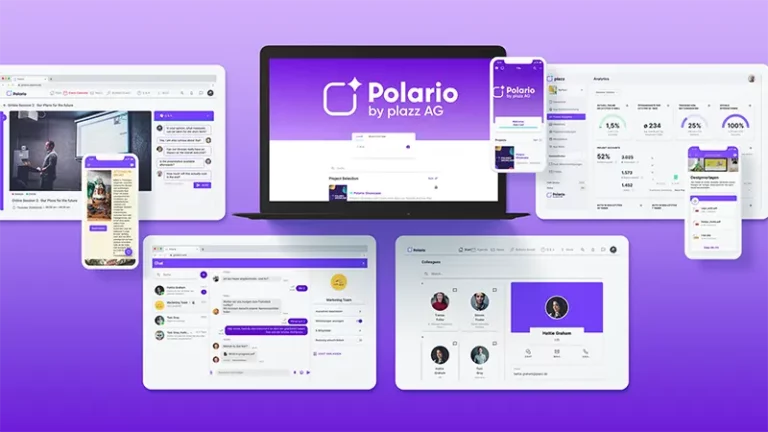Organizers are always faced with the task of creating extraordinary events and controlling costs at the same time. Event apps offer a pioneering solution here: they save both time and resources and also significantly improve the attendee experience. In this blog post, we explore how event apps can not only help to reduce costs, but also increase participant loyalty and optimize the event process.
Discover with us how these digital tools can simplify and sustainably improve the organization of events.
Effective cost management for event planning and implementation
Efficient cost management not only ensures that the budget is adhered to, but also ensures that every expenditure brings the greatest possible benefit. Thoughtful management of event costs is the key to unforgettable events – through precise budgeting and flexible adaptation to unforeseen challenges.
In addition to the financial aspect, good cost management strengthens customers’ trust in the organizers and promotes long-term business relationships. Successful cost management is therefore essential for success and sustainable impact in the event business.
Typical cost traps in event planning
When planning events, there are often hidden costs that can quickly exceed the budget. Common stumbling blocks include:
- Venue: Exclusive locations or flexible dates often require high expenses.
- Catering: Unexpected numbers of guests can lead to over- or under-catering, resulting in either waste or additional costs.
- Technical equipment: Hiring audio and video equipment is often expensive and sometimes unnecessary extras are also booked.
- Cancellation risks: Cancellations or changes to speakers, artists or suppliers can result in high fees.
- Staff: Overtime and additional staff for registration and support can put a strain on the budget.
- Printing and mailing costs: Printed advertising material, programs and invitations can be expensive, especially if changes have to be made at short notice.
By identifying and effectively managing these risks at an early stage, event organizers can better control costs. Event apps can help to overcome some of these challenges or even avoid them altogether. In the following sections, you will learn how event apps can mitigate these risks and offer additional benefits at the same time.
What is an event app?
To understand the cost savings of event apps, you first need to understand how they work. Event apps are specially developed mobile applications that aim to make the planning and execution of events more efficient and enjoyable. They serve as versatile digital platforms for participants, organizers and exhibitors alike. The most important functions of an event app include
- Personalized schedules: Users can create their own event schedule and are informed in real time about changes to sessions and speakers.
- Networking tools: The app enables the exchange of messages and the planning of meetings to facilitate networking.
- Digital tickets and registration: QR codes and mobile tickets simplify the check-in process, reducing the need for printed material and additional staff.
- Sponsor and exhibitor presentations: Digital stands and profiles offer an easy way to access information about sponsors and exhibitors.
- Real-time feedback and surveys: Organizers can immediately collect feedback from participants and improve the quality of the event.
- Data analysis and reports: The app collects and analyzes participant data, providing valuable insights for future events.
These diverse functions optimize the experience for everyone involved, improve communication and make event management more efficient. The savings potential offered by the use of event apps is particularly noteworthy. In the next section, we will look in detail at how event apps help to reduce costs.
Reducing costs with the help of event apps
Event apps are an innovative way to save costs when organizing and running events. These digital helpers combine efficient management with cost efficiency. Both direct and indirect savings can be realized through the use of event apps. The benefits are not only measurable in quantitative terms, but can also be felt in qualitative terms by optimizing the entire event planning and implementation process.
Direct cost reduction with event apps
-
Automation of registration and ticket management
Event apps allow attendees to register and manage their tickets themselves, eliminating the need for extensive reception staff and printed tickets. This not only reduces potential sources of error, but also improves data quality for event management.
-
Refinancing through sponsoring
Event apps offer a wide range of sponsorship opportunities. Sponsors are looking for added value and visibility, and an event app can offer both. By assigning specific areas within the app, such as sponsored sessions, interactive surveys or virtual exhibition stands, sponsors can interact directly with participants. This added value can lead to sponsors being prepared to cover part of the event costs.
-
Flexible updating of the agenda
Program changes are often unavoidable at events. An event app enables quick and free updates to the agenda. This not only saves the cost of reprinting materials, but also avoids the associated logistical challenges.
-
Reduction of no-shows
With event apps, reminders and updates can be easily communicated, which increases the willingness to participate and reduces the rate of no-shows.
-
Going paperless
The use of event apps makes printed advertising material and programs superfluous. This leads to considerable savings in printing and shipping costs and at the same time protects the environment. Participants can access all information in real time on their mobile devices, which also improves the user experience.
-
More accurate forecasts for catering and resources
Through queries, such as menu selection or general willingness to participate, organizers receive valuable data for resource planning. This enables precise provision and helps to avoid costs due to miscalculations.
Indirect cost reduction with event apps
In addition to direct savings, event apps also offer long-term financial benefits that are not visible at first glance:
-
Efficient resource allocation through real-time feedback
Real-time feedback obtained via an event app allows organizers to optimize resource allocation during the event. If certain sessions are unexpectedly popular, you can react quickly and reorganize rooms or staff accordingly. This flexibility improves the participant experience and ensures more efficient use of existing resources, avoiding overinvestment in areas that are less in demand.
-
Increased participant satisfaction and loyalty
A user-friendly event app can significantly increase participant satisfaction. Satisfied participants are more likely to share their positive experiences, which leads to effective word-of-mouth advertising. This reduces the need for costly marketing and advertising measures, as the participants themselves become advocates for the event, thus reducing marketing costs.
-
Optimized data analysis for future events
Event apps collect extensive data about the preferences and behavior of participants. This information enables organizers to plan future events more precisely and deploy resources in a more targeted manner. For example, by analyzing the feedback, topics and speakers can be identified that are particularly well received, making the planning of future programs easier and more efficient.
Indirect savings are often more difficult to measure than direct savings, but they are crucial for sustainable cost reduction and the long-term success of events. Event apps are therefore not only proving to be a tool for cutting costs now, but also a foundation for future growth.
Event apps advantages in quality
Event apps offer far more than just cost savings – they raise the quality of an event to a new level that is often difficult to quantify. By personalizing the experience for each participant, they promote a strong sense of community and active participation. The ability to communicate directly via the app creates a dynamic environment in which feedback can be taken into account immediately. This leads to an improved event experience and inspires the participants.
Event apps open up new, innovative platforms for sponsors to increase their visibility and interactivity. These multiple functions help to not only build an outstanding event, but also strengthen brand loyalty and create a community that lasts beyond the event itself.
Event app requirements
Choosing the right event app is a key factor in the success of an event. Flexibility and reliability are particularly essential. Organizers should be able to adjust settings even while the event is running. An open platform that supports the integration of tools such as MS Teams or Zoom for smaller breakout sessions is also advantageous.
Event apps should be versatile, enable individual branding and work on different devices. Additional functions such as multilingualism, the integration of documents, interactive modules for Q&A and surveys as well as extended analysis options are just as useful. Data protection in accordance with the GDPR and flexible pricing models also play an important role.
Ideas for event planning
Thorough planning is at the heart of every successful event. It all starts with clearly defining the event objectives to ensure that all measures are aimed at achieving these objectives. Analyzing the target group is crucial in order to design an event that is tailored to their needs and interests. A well-thought-out budget protects against financial surprises and ensures that everything runs smoothly. As already mentioned, event apps can help to better control costs.
Equally important are targeted promotion, the use of digital tools to increase participant engagement and the implementation of comprehensive safety concepts. Taken together, these aspects contribute to creating an outstanding and unforgettable event.
Conclusion
Event apps have the potential to fundamentally change the way events are planned and carried out. They offer both direct cost savings, for example in printing costs, and indirect benefits such as improved data analysis and greater participant loyalty. With a wide range of functions, they facilitate and enrich modern events considerably. Finally, we encourage you to consider using an event app at your next event. This decision can not only significantly reduce costs, but also improve the quality and experience of your event in the long term.



